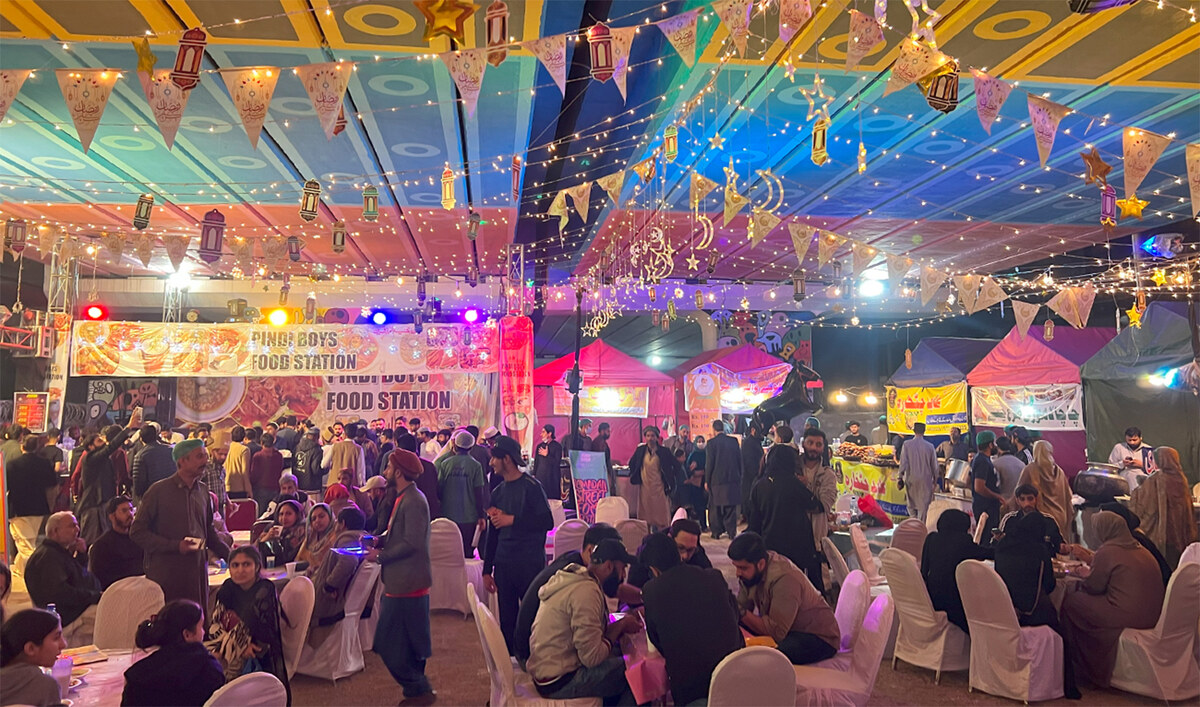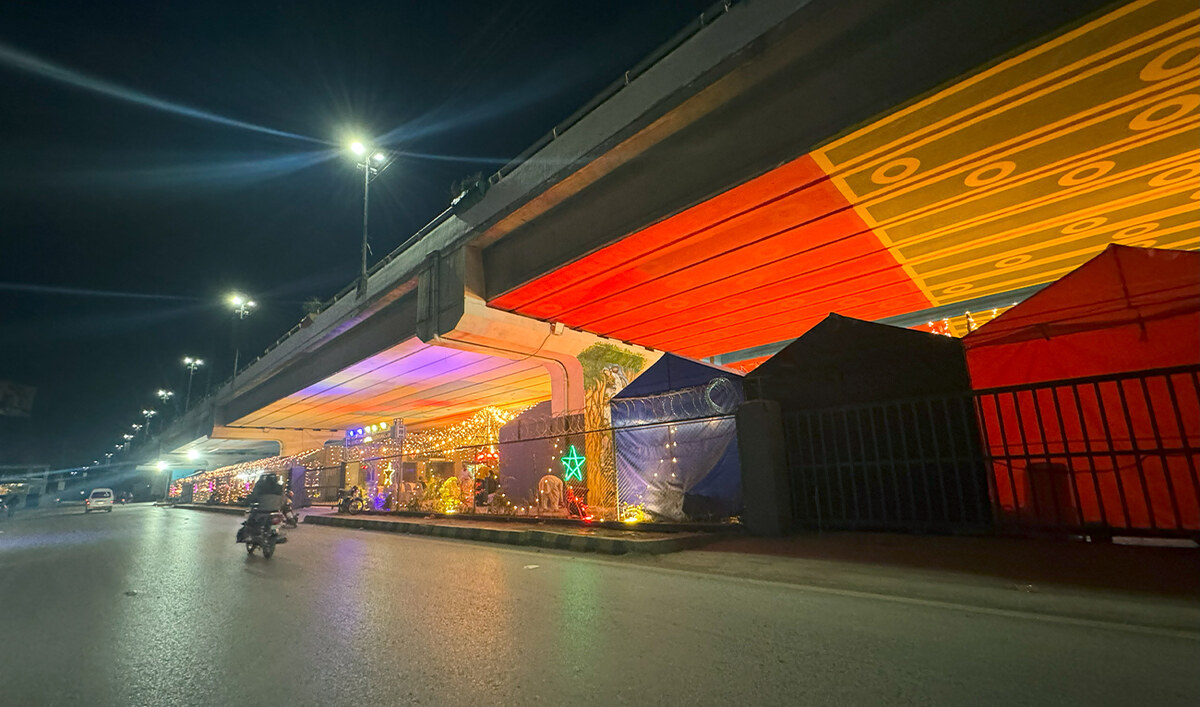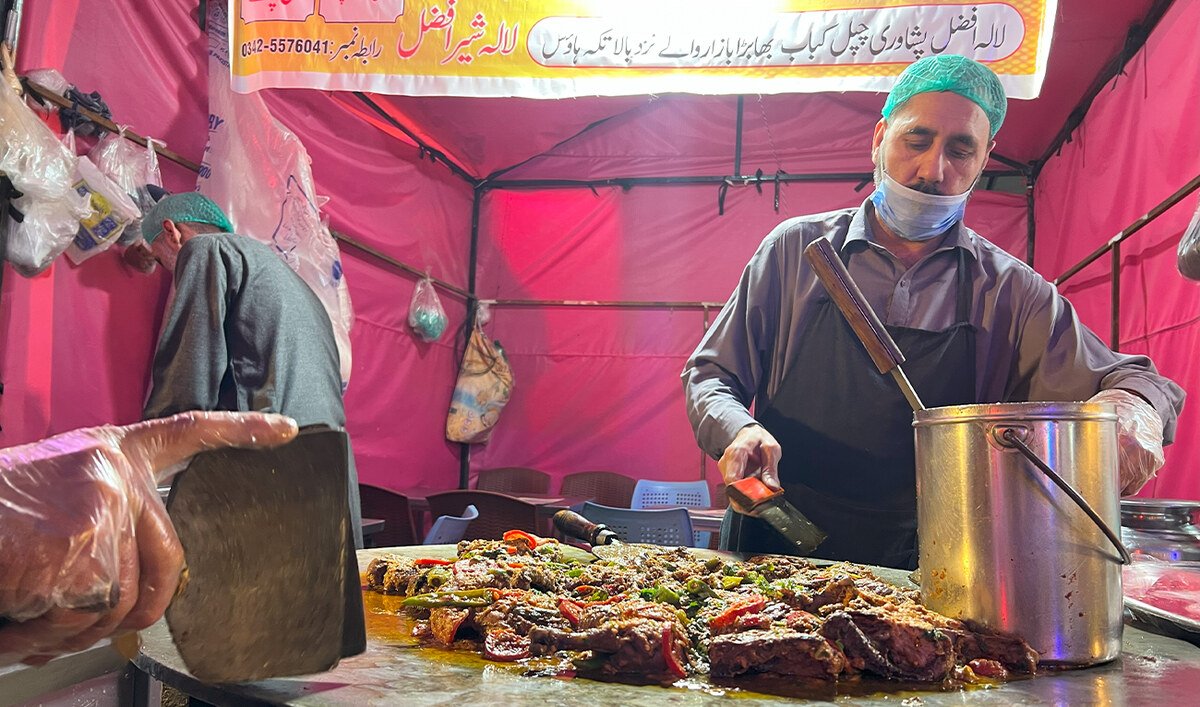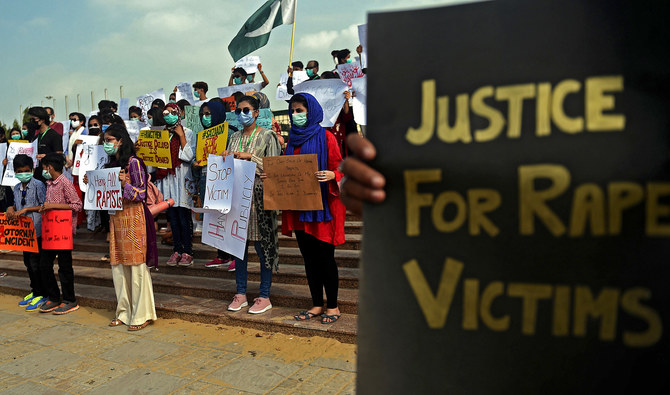ISLAMABAD: It’s no surprise the Pakistani street wants faster, harsher justice for sexual crimes following the gang-rape of a woman on a highway last week that has caused uproar in the South Asian nation but rights advocates say the government should focus on strengthening the criminal justice system to ensure ‘certainty of punishment’ instead of making calls for public hangings and chemical castrations.
Last week, a mother of two was driving along a major highway near Lahore when her car ran out of fuel. As she waited for help along the road, at least two men arrived, dragged the woman out of her car and raped her at gunpoint, in front of her children.
In an interview aired on Monday, Prime Minister Imran Khan said he believed the culprits should be hanged publicly or chemically castrated.
Rights advocates and lawyers have cried foul at the suggestion, saying Pakistan needs better policing and prosecutions, not new laws or punishments that will trample fundamental rights in the government’s rush to be in tune with popular rage.
“In most countries that allow chemical castrations, these are only carried out in a regulated manner against perpetrators of child sexual abuse, in consultation with doctors and psychologists,” Reema Omer, legal adviser South Asia for International Commission of Jurists, told Arab News.
She said that the punishment is “often voluntary and a condition for such offenders to get parole.”
“Their objective is rehabilitation and preventing repeat offenses,” the lawyer said. “They are not viewed as exemplary punishment of all kinds of sexual offenses, which appears to be what the prime minister is considering for Pakistan.”
Rape is a criminal offense in Pakistan, with punishment ranging from up to 25 years in prison to the death penalty. No official data is available for the number of rape cases in the country, though experts estimate they are in the thousands each year.
In Pakistan, the conviction rate in rape cases is under three percent, according to the Karachi-based War Against Rape (WAR).
Omer said that every time a rape grabbed headlines in Pakistan, there was public outrage and an ‘erroneous focus’ on enhancing the sentence: “Even the most severe penalty won’t be a deterrent for such crimes if perpetrators know there is less than five percent chance they will be convicted,” she said.
If Pakistan enacts laws to make chemical castration of sexual abusers legal, it will join a small group of nations that allow such a punishment, including Indonesia, Poland, Russia, and Estonia, as well as some states in the United States. In 2011, South Korea became the first Asian country to use chemical castration as a punishment.
The procedure involves using a drug to reduce testosterone levels and affect the sex drive.
Sarah Zaman, former director at War Against Rape, said rape was prevalent in Pakistan because of “impunity” and systematic flaws in the criminal justice system that helped culprits escape accountable.
“We need to defeat the culture in our society that encourages such crimes instead of raising the punishments,” she told Arab News, adding that the government need to work on increasing conviction rates in rape cases.
“It’s ignorant, short-sighted and non-serious,” Zaman said when asked about the PM’s suggestion that rapists be chemically castrated. “Also, this won’t help reduce impunity to the criminals.”
Dr. Qibla Ayaz, chairman of the Council of Islamic Ideology, a body that advices the government on the compatibility of laws with Islam, said the council had recommended that the government establish special courts that could hear cases of heinous crimes like rape.
“Sufficient laws and strict punishments regarding rape already exist, and we just need to ensure their implementation to deter the crime,” he told Arab News.
Maliha Zia Lari, a human rights activist and lawyer, also suggested that the government focus on “certainty of the punishment” through cogent reforms in the criminal justice system.
“We need to understand that rape is a power offense and not a lust crime,” she said. “We need to change the patriarchal mindset to curb sexual violence against women.”
Rights advocates wary as Pakistan suggests public executions, chemical castration after gang-rape
https://arab.news/jyv5z
Rights advocates wary as Pakistan suggests public executions, chemical castration after gang-rape

- Activists and legal experts urge government to strengthen criminal justice system, ensure ‘certainty of punishment’ rather than opt for stopgap solutions
- Council of Islamic Ideology says adequate laws and punishments regarding rape already exist and need to be implemented properly
World Bank approves $102 million for Pakistan’s microfinance sector to bolster climate resilience

- The initiative aims to provide essential financial services to those in need, especially in rural areas
- The finance ministry will implement the project that will lead to the establishment of a Climate Risk Fund
ISLAMABAD: The World Bank has approved $102 million for a new project aimed at expanding access to microcredit and strengthening Pakistan’s microfinance sector against climate-related shocks, the global lender said in a statement on Wednesday.
The Resilient and Accessible Microfinance (RAM) Project seeks to support nearly 1.89 million people in the country, including over 1 million women and 350,000 youth, primarily in rural and low-income communities.
By providing funds to microfinance institutions, the project aims to ensure continued financial services for vulnerable populations, especially in times of economic and climate-induced disruptions.
“Microfinance is a critical tool for supporting the livelihoods of vulnerable populations in Pakistan,” the statement quoted World Bank Country Director Najy Benhassine as saying. “This project will help strengthen the resilience of the microfinance sector, particularly in the face of growing climate risks, ensuring that the sector can continue to provide essential financial services to those who need them most, especially in rural areas.”
He said the project was part of the World Bank’s broader commitment to promoting financial inclusion in Pakistan and enhancing resilience to climate change, as outlined in its 10-year Country Partnership Framework.
The RAM Project will focus on expanding access to microcredit, particularly through “recovery loans” for individuals and small businesses seeking financial stability after climate-related disasters.
“The project has been designed based on lessons learned from the devastating floods of 2022 and is a significant step to bolster financial inclusion in Pakistan,” said Namoos Zaheer, Task Team Leader for the project. “It will enhance economic empowerment and resilience of those at the bottom of the economic pyramid, particularly women, small farmers and families in rural areas who are more prone to climate shocks.”
The initiative, to be implemented by Pakistan’s Ministry of Finance through the State Bank of Pakistan, will include the establishment of a Climate Risk Fund, innovative use of agrotechnology solutions, capacity building for microfinance institutions and risk management frameworks to strengthen the sector’s resilience.
Pakistan has been a World Bank member since 1950 and has received more than $48.3 billion in assistance over the years.
The bank’s current portfolio in the country includes 54 projects totaling $15.7 billion.
Pakistan PM to begin four-day Saudi visit today to bolster trade, economic ties

- Shehbaz Sharif will hold meeting with Crown Prince Mohammed bin Salman, says the foreign office
- The two leaders are expected to deliberate on global developments, including the situation in Gaza
ISLAMABAD: Prime Minister Shehbaz Sharif is scheduled to start his four-day visit to Saudi Arabia today, Wednesday, according to the foreign office in Islamabad, to discuss ways to further enhance bilateral trade and strengthen collaboration in key economic sectors.
Pakistan has tried to strengthen business-to-business (B2B) ties with the Kingdom, with both sides announcing during Prime Minister Shehbaz Sharif’s visit to Riyadh last October they had signed 34 memorandums of understanding and agreements worth $2.8 billion to enhance private sector collaboration and commercial partnerships.
The two countries enjoy close defense, diplomatic, political and cultural relations, though they have consolidated their ties further in recent years as Pakistan grappled with a prolonged economic crisis and sought the kingdom’s help.
“During the visit, the Prime Minister is scheduled to meet Saudi Crown Prince and Prime Minister Mohammed bin Salman,” the foreign office said in statement issued on Tuesday, announcing Sharif’s visit to the Kingdom from March 19 to 22. “The leaders will discuss and deliberate upon ways to boost trade, enhance partnership in key sectors and facilitate greater economic collaboration.”
The statement said they would also focus on regional and global developments, including the Gaza situation, evolving Middle East dynamics and broader issues concerning the Muslim Ummah.
Saudi Arabia presents a key export opportunity for Pakistani businesses, given its strong consumer demand and ambitious Vision 2030 economic reforms that emphasize diversification and foreign investments.
Pakistan has a 2.7 million-strong diaspora in Saudi Arabia, which accounts for the highest remittance inflow, a crucial lifeline for the country’s economy.
Last month, Pakistan’s commerce minister, Jam Kamal Khan, inaugurated the country’s first-ever solo “Made in Pakistan” exhibition in Jeddah, informing participants that over 1.7 million Pakistani workers had migrated to the Kingdom in the past five years, making it the top destination for Pakistani emigrants.
Sharif will be accompanied by Deputy Prime Minister and Foreign Minister Senator Ishaq Dar, along with key federal ministers and senior officials. The delegation is expected to engage with Saudi counterparts to explore new avenues of investment and economic cooperation.
Pakistani diplomat at UN slams Israel’s ‘extremist leaders’ for continuing Gaza war for political survival

- Ambassador Munir Akram says Israel undermined Gaza ceasefire through humanitarian blockade, restricting Al Aqsa access
- He tells the world body the only way to peace is to end Israel’s ‘slaughter’ of innocent Palestinians in the war-torn region
ISLAMABAD: Pakistan’s top diplomat at the United Nations on Tuesday criticized Israel’s “extremist leaders” for continuing the war in Gaza for their own political survival, as fresh Israeli airstrikes killed about 400 people, threatening to unravel a fragile ceasefire.
Addressing a UN Security Council briefing on the humanitarian situation in Gaza, Ambassador Munir Akram accused Israel of systematically eroding the ceasefire agreement reached in January and called for an end to its “slaughter” of the Palestinian people.
The ceasefire agreement was reached on January 15 following more than a year of Israeli airstrikes that flattened much of Gaza’s infrastructure, including schools, hospitals and residential neighborhoods.
In the weeks that followed, Hamas, which governs the enclave, returned several batches of Israeli hostages taken at the start of the war, and the international community began to discuss reconstruction plans for the war-ravaged territory.
“The agreement of 15th January for a ceasefire, for a three-phase ceasefire, offered a sliver of hope for the Palestinian people, for the Israeli people, and for the world community,” Akram said. “The Arab and OIC [Organization of Islamic Cooperation] reconstruction and peace plan was under consideration in capitals. It offered a road to peace.”
“But obviously, this glimmer of hope and hope for peace was not to the liking of the extremist leaders who rule Israel today,” he continued. “They see their survival in the continuation of the war.”
Akram said Israeli was guilty of violating every article of international law, urging the world community to respond with justice or risk the world order’s regression “into the barbarism from which the Charter of the United Nations was supposed to rescue us.”
Akram highlighted Israel’s deliberate efforts to dismantle the ceasefire agreement, starting with the imposition of a humanitarian blockade of Gaza. This, he said, was followed by restrictions on Palestinian Muslims from accessing Al-Aqsa Mosque during the holy month of Ramadan.
“These are all tactics of the oppressor,” he maintained. “And now, they have escalated to blatantly violate the ceasefire and resume attacks against the helpless Palestinians in Gaza who were just returning to rebuild their homes.”
The Pakistani envoy called for the resumption of humanitarian aid to the Palestinian enclave and the need for a revival of negotiations leading to a two-state solution, with an independent Palestinian state along pre-1967 borders and East Jerusalem as its capital.
“The upcoming June conference, co-chaired by France and Saudi Arabia, is an important opportunity for the peaceful resolution of the Palestinian question and the implementation of the two-state solution,” he said, adding that “to realize the possibility of peace, Israel’s aggression, its attacks and its slaughter of the Palestinians must stop.”
‘New Kartarpura Food Street’ lights up Ramadan nights in Pakistan’s twin cities

- Market set up under Chandni Chowk flyover on first day of Ramadan will continue to operate after the end of the holy month
- Sellers and customers alike see street as more spacious, less congested alternative to Rawalpindi’s historic Kartarpura Street
RAWALPINDI: As visitors walk into the newly established ‘New Kartarpura Food Street’ at Chandni Chowk in the Pakistani city of Rawalpindi, they are immediately drawn to a unique sight: a group of men dressed in long, ankle-length robes typically worn by men in the Middle East and North Africa, their heads covered in ghutras, spinning lassi with wooden ladles in large metal pots.
The food vendor called Lahore 0 Kilometer is one of around 30 eateries that have come up on the new food street, seen as a more spacious, less crowded and family-friendly alternative to the historic Kartarpura Street in Rawalpindi.
Kartarpura Street was part of Rawalpindi’s Sikh neighborhood and the city’s main commercial area in the 19th century but over the past few decades has developed into a major food street and become famous for dishes such as nihari, a stew of tender beef or mutton meat with bone marrow, and siri paye, a traditional breakfast dish of cow or goat head and trotters. Lassi, both saltish and sweet, remains a key attraction, with a large number of vendors coming from Lahore and Gujranwala to sell the yogurt–based beverage, which is a staple at iftar and suhoor meals, especially when Ramadan falls in warmer months.
But customers and sellers alike have long complained of traffic congestion and overcrowdedness on the narrow street. This year, many of the stalls and food vendors have been shifted to the New Kartarpura Food Street, set up under the Chandni Chowk flyover on the first day of Ramadan. The market will continue to operate after the end of the holy month.
“Our main branch is in Kartarpura, but this venue has created a new trend, a proper space for families,” Abdul Latif Rashid, from the famed Kala Khan Nihari House, told Arab News. “Because of that, the [public] response here has been very good.”

The food street’s organizer, Raja Usama, said the idea for the new market was inspired by Ramadan food festivals in Dubai.
“Different kinds of food are available here,” he told Arab News. “Small, new businesses and young people are also being promoted. Families are being given a good environment.”

Muhammad Hamza at Lahore 0 Kilometer said people were coming from both Rawalpindi and Islamabad to try their lassi, which sells in seven flavors for between $0.71 to $2.85.
“We have great love for Arab countries. The attire I am wearing has been given a lot of respect by the [local] people, and I wish to wear the same attire when I visit Saudi Arabia,” Hamza told Arab News, as people stopped to take photos of him preparing lassi in his thobe and ghutra.

For visitors like Mahnoor Kareem, a Chinese language instructor, the new food street provides much-needed respite to the overcrowded old Karparpura.
“Kartarpura in Rawalpindi is very famous, especially for sehri [suhoor], but we never went there because it’s always too crowded. Most people prefer to come here with their families,” she said. “We tried their paye and lassi, and we really liked it.”
Kanwal Zahra, who sells Pakistani cuisine, has also set up shop at the new food market.
“We serve traditional dishes passed down from our grandmothers, roti made from pure wheat flour, special jaggery and sugar tea, palak paneer, and lassi,” she said.

Besides traditional dishes, the food street also has more innovative offerings.
“Initially, people said they did not eat momos, especially boys,” dumplings vendor Meena Nabeel said. “But once they try, they come back with their friends and say that it is good, they like the taste. The filling and dough get a lot of praise. Our sauces also receive a lot of compliments.”
Authorities impose curfew in three northwestern Pakistani districts amid rise in militant attacks

- Pakistan has been rocked by back-to-back militant attacks, including a train hijacking, in its western regions that border Afghanistan in recent weeks
- The precarious security situation on Tuesday huddled together the civil-military leadership, which called for a unified stance to counter the surge
ISLAMABAD: The local administration has imposed a curfew in several areas of northwestern Pakistani districts of North Waziristan, South Waziristan and Tank on Wednesday, the respective district authorities said, amid a rise in militant attacks in the South Asian country.
Pakistan has witnessed a sharp increase in militant attacks in its northwestern Khyber Pakhtunkhwa (KP) and southwestern Balochistan provinces, with an unprecedented train hijacking killing 31 people, including security men, in Balochistan’s Bolan range last week, followed by a suicide attack in Nushki that killed five people on Sunday. In KP, the Pakistani Taliban, or the Tehreek-e-Taliban Pakistan (TTP), and other militant groups have mounted their attacks in recent months, frequently targeting security forces convoys and check-posts, besides targeted killings and kidnappings of law enforcers and government officials.
The precarious security situation prompted top Pakistani civilian and military leaders to huddle together at the Parliament House on Tuesday to carve out a strategy to deal with the renewed wave of militancy. Senior military and intelligence officials briefed participants at Tuesday’s meeting, following which Prime Minister Shehbaz Sharif called on the country’s political leadership to unite in its resolve to combat militants with “the full force of the state.”
The office of the deputy commission in KP’s Tank district announced that a curfew will remain in place from 6am till 6pm from Kaur Fort to Manzi-Khirgi to Jandola areas on Wednesday, while the Dabarra market will also remain closed during this period, citing “heightened threat” to the movement of law enforcement agencies.
“All concerned are requested to cooperate with security forces and avoid traveling during curfew hours,” the Tank deputy commissioner’s office said in a notification.
The development comes weeks after a paramilitary troop and 12 militants were killed in a gunbattle in the district after the militants carried out a suicide attack at the Frontier Constabulary (FC) headquarters, a police official with direct knowledge of the development said.
The attack took place in the Jandola tehsil.
In South Waziristan, a curfew will remain imposed along the Aziz Abad Chowk-Sarwakal-Jandola, Spin Jumat-Asman Manza-Ladha-Makin, and Bibi Raghzai-Kotkai-Jandola roads, according to the local administration.
Authorities in North Waziristan asked people to abide by the curfew from 6am till 6pm in Nawaz Kot Bridge to Dunkan, Tehsil Razmak, and Dunkan to Malogai Bridge in Tehsil Dossali in the wake of “current spell of insurgency, terrorism and targeting of security forces by the militants.”
Both North and South Waziristan districts, which border Afghanistan, had been a stronghold of the Pakistani Taliban before successive military operations drove the militants out of the region more than a decade ago.
Pakistan ranks as the second-most affected country by terrorism, according to The Global Terrorism Index 2025. Militancy-related deaths surged by 45%, rising from 748 in 2023 to 1,081 in 2024, marking one of the steepest global increases.
Militant attacks in Pakistan more than doubled from 517 in 2023 to 1,099 in 2024. Balochistan and Khyber Pakhtunkhwa remained the hardest-hit provinces, accounting for over 96 percent of attacks and fatalities.
Pakistani officials have accused the neighboring India and Afghanistan of fanning militancy in KP and Balochistan provinces. New Delhi and Kabul both deny the accusation.














